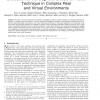Free Online Productivity Tools
i2Speak
i2Symbol
i2OCR
iTex2Img
iWeb2Print
iWeb2Shot
i2Type
iPdf2Split
iPdf2Merge
i2Bopomofo
i2Arabic
i2Style
i2Image
i2PDF
iLatex2Rtf
Sci2ools
113
click to vote
TVCG
2010
2010
Evaluation of the Cognitive Effects of Travel Technique in Complex Real and Virtual Environments
—We report a series of experiments conducted to investigate the effects of travel technique on information gathering and cognition in complex virtual environments. In the first experiment, participants completed a non-branching multilevel 3D maze at their own pace using either real walking or one of two virtual travel techniques. In the second experiment, we constructed a realworld maze with branching pathways and modeled an identical virtual environment. Participants explored either the real or virtual maze for a predetermined amount of time using real walking or a virtual travel technique. Our results across experiments suggest that for complex environments requiring a large number of turns, virtual travel is an acceptable substitute for real walking if the goal of the application involves learning or reasoning based on information presented in the virtual world. However, for applications that require fast, efficient navigation or travel that closely resembles real-world behavior, ...
Related Content
| Added | 31 Jan 2011 |
| Updated | 31 Jan 2011 |
| Type | Journal |
| Year | 2010 |
| Where | TVCG |
| Authors | Evan A. Suma, Samantha L. Finkelstein, Myra Reid, Sabarish Babu, Amy Catherine Ulinski, Larry F. Hodges |
Comments (0)

